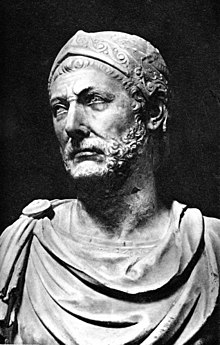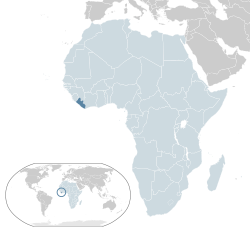|
Liberia
World’s Greatest Conquerors:
Hannibal
1997 Proof Silver 20 Dollars 38.75mm (32.23 grams) 0.925 Silver (0.9511 oz. ASW)
Certification: NGC
PF 69 ULTRA CAMEO 2862162-013
REPUBLIC OF LIBERIA THE LOVE OF LIBERTY BROUGHT US HERE 20 00 REPUBLIC OF LIBERIA 20 DOLLARS, Seal of Liberia.
Hannibal $20, Hannibal statue in Capua, Italy.
You are bidding on the exact item pictured, provided with a Certificate of Authenticity and Lifetime Guarantee of Authenticity.
Hannibal
(247 – between 183 and 181 BC) was a Carthaginian general and statesman who commanded the forces of Carthage in their battle with the Roman Republic during the Second Punic War. He is widely regarded as one of the greatest military commanders in history.
 Hannibal’s father, Hamilcar Barca, was a leading Carthaginian general during the First Punic War. His younger brothers were Mago and Hasdrubal; his brother-in-law was Hasdrubal the Fair, who commanded other Carthaginian armies. Hannibal lived during a period of great tension in the Mediterranean Basin, triggered by the emergence of the Roman Republic as a great power with its defeat of Carthage in the First Punic War. Revanchism prevailed in Carthage, symbolized by the pledge that Hannibal made to his father to “never be a friend of Rome”. Hannibal’s father, Hamilcar Barca, was a leading Carthaginian general during the First Punic War. His younger brothers were Mago and Hasdrubal; his brother-in-law was Hasdrubal the Fair, who commanded other Carthaginian armies. Hannibal lived during a period of great tension in the Mediterranean Basin, triggered by the emergence of the Roman Republic as a great power with its defeat of Carthage in the First Punic War. Revanchism prevailed in Carthage, symbolized by the pledge that Hannibal made to his father to “never be a friend of Rome”.
In 218 BC, Hannibal attacked Saguntum (modern Sagunto, Spain), an ally of Rome, in Hispania, sparking the Second Punic War. Hannibal invaded Italy by crossing the Alps with North African war elephants. In his first few years in Italy, he won a succession of victories at the Battle of the Trebia, Lake Trasimene, and Cannae, inflicting heavy losses on the Romans. Hannibal was distinguished for his ability to determine both his and his opponent’s respective strengths and weaknesses, and to plan battles accordingly. His well-planned strategies allowed him to conquer several Italian cities that were allied to Rome. Hannibal occupied most of southern Italy for 15 years. The Romans, led by Fabius Maximus, avoided heavy confrontation with him, instead waging a war of attrition. Carthaginian defeats in Hispania prevented Hannibal from being reinforced, and he was unable to win a decisive victory. A counter-invasion of North Africa, led by Roman General Scipio Africanus, forced him to return to Carthage. Hannibal was eventually defeated at the Battle of Zama, ending the war in Roman victory.
After the war, Hannibal successfully ran for the office of sufet. He enacted political and financial reforms to enable the payment of the war indemnity imposed by Rome; however, those reforms were unpopular with members of the Carthaginian aristocracy and in Rome, and he fled into voluntary exile. During this time, he lived at the Seleucid court, where he acted as military advisor to Antiochus III the Great in his war against Rome. Antiochus met defeat at the Battle of Magnesia and was forced to accept Rome’s terms, and Hannibal fled again, making a stop in the Kingdom of Armenia. His flight ended in the court of Bithynia. He was betrayed to the Romans and committed suicide by poisoning himself.
Hannibal is often regarded as one of the greatest military tacticians and one of the greatest generals of Mediterranean antiquity, together with Philip of Macedon, Alexander the Great, Julius Caesar, Scipio Africanus and Pyrrhus. Plutarch states that Scipio supposedly asked Hannibal “who the greatest general was”, to which Hannibal replied “either Alexander or Pyrrhus, then himself”.
 Liberia officially the Republic of Liberia, is a country on the West African coast. Liberia means “Land of the Free” in Latin. It is bordered by Sierra Leone to its west, Guinea to its north and Ivory Coast to its east. It covers an area of 111,369 square kilometres (43,000 sq mi) and is home to 4,503,000 people. English is the official language and over 20 indigenous languages are spoken, representing the numerous tribes who make up more than 95% of the population. Liberia officially the Republic of Liberia, is a country on the West African coast. Liberia means “Land of the Free” in Latin. It is bordered by Sierra Leone to its west, Guinea to its north and Ivory Coast to its east. It covers an area of 111,369 square kilometres (43,000 sq mi) and is home to 4,503,000 people. English is the official language and over 20 indigenous languages are spoken, representing the numerous tribes who make up more than 95% of the population.
 Forests on the coastline are composed mostly of salt-tolerant mangrove trees, while the more sparsely populated inland has forests opening onto a plateau of drier grasslands. The climate is equatorial, with significant rainfall during the May-October rainy season and harsh harmattan winds the remainder of the year. Liberia possesses about forty percent of the remaining Upper Guinean rainforest. It was an important producer of rubber in the early 20th century. Forests on the coastline are composed mostly of salt-tolerant mangrove trees, while the more sparsely populated inland has forests opening onto a plateau of drier grasslands. The climate is equatorial, with significant rainfall during the May-October rainy season and harsh harmattan winds the remainder of the year. Liberia possesses about forty percent of the remaining Upper Guinean rainforest. It was an important producer of rubber in the early 20th century.
The Republic of Liberia, beginning as a settlement of the American Colonization Society (ACS), declared its independence on July 26, 1847. The United States did not recognize Liberia’s independence until after the American Civil War on February 5, 1862. Between January 7, 1822 and the American Civil War, more than 15,000 freed and free-born Black Americans from United States and 3,198 Afro-Caribbeans relocated to the settlement. The Black American settlers carried their culture with them to Liberia. The Liberian constitution and flag were modeled after the United States. In January 3, 1848 Joseph Jenkins Roberts, a wealthy free-born Black American from Virginia who settled in Liberia, was elected as Liberia’s first president after the people proclaimed independence.
Unlike other African countries, Liberia is the only African republic to have self-proclaimed independence without gaining independence through revolt from any other nation, being Africa’s first and oldest republic. Although it is said that neither Liberia nor Ethiopia, which was a kingdom, were controlled or colonized by foreign powers, this seems contradictory since the country was actually started by the American Colonization Society (ACS). Liberia maintained and kept its independence during the European colonial era.
During World War II, Liberia supported the United States war efforts against Germany and in turn the United States invested in considerable infrastructure in Liberia to help its war effort, which also aided the country in modernizing and improving its major air transportation facilities. In addition, President William Tubman encouraged economic changes. Internationally, Liberia was a founding member of League of Nations, United Nations and the Organisation of African Unity.
Longstanding political tensions from the 27 year rule of William Tubman resulted in a military coup in 1980 that overthrew the leadership soon after his death, marking the beginning of political instability. Five years of military rule by the People’s Redemption Council and five years of civilian rule by the National Democratic Party of Liberia were followed by two civil wars – the First and Second Liberian Civil Wars. These resulted in the deaths and displacement of more than half a million people and devastated Liberia’s economy. A peace agreement in 2003 led to democratic elections in 2005. Recovery proceeds but about 85% of the population live below the international poverty line.
|









 Hannibal’s father, Hamilcar Barca, was a leading Carthaginian general during the First Punic War. His younger brothers were Mago and Hasdrubal; his brother-in-law was Hasdrubal the Fair, who commanded other Carthaginian armies. Hannibal lived during a period of great tension in the Mediterranean Basin, triggered by the emergence of the Roman Republic as a great power with its defeat of Carthage in the First Punic War. Revanchism prevailed in Carthage, symbolized by the pledge that Hannibal made to his father to “never be a friend of Rome”.
Hannibal’s father, Hamilcar Barca, was a leading Carthaginian general during the First Punic War. His younger brothers were Mago and Hasdrubal; his brother-in-law was Hasdrubal the Fair, who commanded other Carthaginian armies. Hannibal lived during a period of great tension in the Mediterranean Basin, triggered by the emergence of the Roman Republic as a great power with its defeat of Carthage in the First Punic War. Revanchism prevailed in Carthage, symbolized by the pledge that Hannibal made to his father to “never be a friend of Rome”.  Liberia officially the Republic of Liberia, is a country on the West African coast. Liberia means “Land of the Free” in Latin. It is bordered by Sierra Leone to its west, Guinea to its north and Ivory Coast to its east. It covers an area of 111,369 square kilometres (43,000 sq mi) and is home to 4,503,000 people. English is the official language and over 20 indigenous languages are spoken, representing the numerous tribes who make up more than 95% of the population.
Liberia officially the Republic of Liberia, is a country on the West African coast. Liberia means “Land of the Free” in Latin. It is bordered by Sierra Leone to its west, Guinea to its north and Ivory Coast to its east. It covers an area of 111,369 square kilometres (43,000 sq mi) and is home to 4,503,000 people. English is the official language and over 20 indigenous languages are spoken, representing the numerous tribes who make up more than 95% of the population. Forests on the coastline are composed mostly of salt-tolerant mangrove trees, while the more sparsely populated inland has forests opening onto a plateau of drier grasslands. The climate is equatorial, with significant rainfall during the May-October rainy season and harsh harmattan winds the remainder of the year. Liberia possesses about forty percent of the remaining Upper Guinean rainforest. It was an important producer of rubber in the early 20th century.
Forests on the coastline are composed mostly of salt-tolerant mangrove trees, while the more sparsely populated inland has forests opening onto a plateau of drier grasslands. The climate is equatorial, with significant rainfall during the May-October rainy season and harsh harmattan winds the remainder of the year. Liberia possesses about forty percent of the remaining Upper Guinean rainforest. It was an important producer of rubber in the early 20th century.




